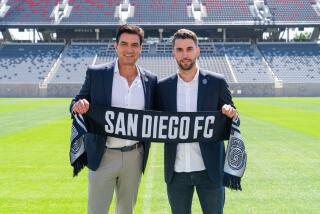Asians See Golden Opportunity, Move to Open Own Banks in San Diego : Immigrants: New Kearny Mesa institutions will target the needs of the growing ethnic group.
- Share via
Others may look at a map of Kearny Mesa and see nothing more than a grid work of streets, retail centers and industrial complexes.
Grover Fang, however, sees a golden opportunity for a bank that caters to the needs of Asian-Americans, particularly recent immigrants from Southeast Asia who are frustrated by U.S. banking rules and customs that they have difficulty comprehending.
He heads a group of 10 Taiwanese-Americans, many of them prominent local businessmen, who have applied to the California Banking Dept. for a charter to open San Diego First Bank, a bank that would target the needs of the growing Asian immigrant population.
If approved, San Diego First would be the third Asian-oriented bank planning to open an office in Kearny Mesa this year. General Bank of Los Angeles and East-West Federal Bank FSB, also headquartered in Los Angeles, have already gained approval to open San Diego branches in the next few months.
All three banks hope to capitalize on the booming Asian-American population and commercial centers in Kearny Mesa. One study estimates the number of Chinese-American owned businesses on Convoy Street alone at more than 100. Restaurants, motels and assorted mom-and-pop operations, many of which are owned by Indochinese and Chinese immigrants, dot the area.
The number of Southeast Asian-American owned businesses in San Diego County is conservatively estimated at 1,500, said Debra Meadows, vice president of J. Mora & Associates, an Orange County-based banking consulting firm that helped Fang’s group prepare its bank charter application by conducting a market survey. Her firm also helped prepare General Bank’s branch application.
In 1982, the last year for which U.S. Census Bureau statistics are available, the total of Southeast Asian- American-owned businesses was 930.
Soft-spoken and unassuming, Fang typifies the low-profile Asian-American businessman. “We like to work hard. We like to keep silent,” Fang said.
San Diego First would not be the first bank opening that Fang’s been involved with. He came to San Diego in 1985 after helping found Texas First National Bank in Houston, the most profitable of that city’s three financial institutions geared toward Asian-Americans.
Fang, 57, is also typical of the bank organizers in that he is an immigrant who has pulled himself up by the bootstraps, becoming a wealthy man in the process. After arriving in the United States in 1967, he worked as a structural engineer at several Los Angeles engineering firms. He started his own grocery store in 1969, then opened a liquor store, motel and a hotel management and construction firm. He became a U.S. citizen in 1974.
Fang now is president of Mandarin Wok, a Los Angeles-based restaurant business run by family members, and is also co-owner of the Quality Suites hotel in Mira Mesa.
Like Fang, most of the 10 organizers of San Diego First are relative newcomers to this country, six having immigrated to the United States after 1977. All are members of the local Taiwanese-American Chamber of Commerce and are well-connected in Taiwanese civic and cultural organizations here, Meadows said.
Organizer Chung-Kwan (Jimmy) Hsu, owner of San Diego-based Budget Trade & Gas Co., said the new bank would be more likely to provide credit to recent immigrants than other lenders. “Not many banks would take the chance to help us out,” Hsu said. He immigrated to the United States in 1977, moving to San Diego a few years later.
Another of the proposed bank’s organizers, Chiu-Shan Chen, chairman of San Diego-based Pacific Biotech, said San Diego First plans to attract business from other Asian ethnic groups besides Taiwanese-Americans.
“Eastern and Western culture are different. For us, we more or less know (the Asian immigrants’) backgrounds. We feel we can serve them better,” said Chen
Chen came to the United States in 1962 as a student at the University of Nevada Reno, where he earned a master’s degree in physics. He has lived in the San Diego area the last 21 years and holds a doctorate in physics from UC San Diego.
In his statement to the state banking department explaining the need for the new bank, Chen said he made several personal loans to immigrants who had excellent credit in their native Asian countries but who could not obtain a loan from a bank in the United States for lack of credit history here.
The proposed bank could also serve Taiwanese immigrants who have difficulty understanding U.S. tax and banking rules. The bank would also have tellers who speak Asian languages.
Fang heard complaints from Asian-Americans after he moved here in 1985, having sold his interests in Texas First to be closer to business interests in Southern California. He became president of the Taiwanese-American Chamber of Commerce in 1987 and heard many in the organization talk up the possibility of starting a community bank. At the time, there were no Asian-oriented banks in the county.
Fang’s background as a founding director of Texas First made him the likely candidate to head a San Diego group of organizers. Texas First’s assets have grown to $55 million since its opening in 1985, said Tom Tsao, president of Texas First.
Roxana Ou, assistant vice president of Sumitomo Bank in San Diego, has worked with Fang on a number of construction and real estate loans made by her bank.
“He’s the leader of the Chinese community,” Ou said. “He has very good business judgment. He makes quick decisions. He’s very professional, and I’ve found in dealing with him that he’s very sharp.”
If San Diego First’s start-up application is approved, Fang will likely become the bank’s chairman, according to several of the San Diego organizers. Fang, though, is reluctant to say so, instead intimating that any of the group’s organizers could become chairman.
About two-thirds of the group’s initial $5 million in capital would be raised among the organizers, the rest from a public stock offering. Fang projects that first-year assets would reach $15 million, and up to $45 million the third year after opening.
Fang said the bank would try to take advantage of increasing trade between the United States and Pacific Rim countries by helping Taiwanese manufacturing companies open branch offices in San Diego. Fang said he still has extensive business contacts in Taiwan, many of whom have in past years sought his help in setting up businesses in California.
“We had always told them to go to the banks that we know,” Fang said. “More and more often that happened. We saw that it would be good for us to open a bank.”
Kellogg Chan, chairman and president of East-West Federal Bank, also saw the possibilities of the San Diego market. Chan said the bank will open a San Diego branch sometime in the second quarter of 1990, depending on the completion of the Convoy Street shopping center where it is to be located.
“I was very impressed with what I saw down there,” Chan said. “We knew there were quite a few (Chinese) churches, restaurants, support businesses and social organizations. Basically, it reminded me a lot of Los Angeles when East-West first opened.”
The Los Angeles-based bank opened in 1973 and now has 15 branches. Chinese-American customers account for 80% to 90% of the bank’s $560 million in assets, Chan said. The San Diego branch would be at the intersection of Convoy Street and Aero Drive, and would target the Chinese community.
“We serve a particular niche,” Chan said.
General Bank also will be situated on Convoy Street and could open as soon as February, said Joyce Lin, the bank’s assistant vice president. The bank hopes to serve the public in general as well as the Asian, Lin said. Most of the bank’s investors are Taiwanese. Its assets are $500 million.
Lin said the demographics of the Kearny Mesa area make it likely that all three Asian-oriented banks will thrive.
The number of Asians living in San Diego County is estimated at 141,000 to 161,000, according to a study prepared by J. Mora & Associates. Based on immigration statistics, at least one-third of the Asians in the county have immigrated within the last 15 years.
Taiwanese and other Chinese in the county are estimated to be 20,000 to 25,000, and at least half that number moved to San Diego County after 1980, according to the study. Taiwanese chamber of commerce officials said the number is more like 50,000.
“I would say it’s overdue for a Chinese-owned bank,” said Susan Liew, a Kearny Mesa developer. She said many in the Chinese community are excited about the banks’ openings. “I foresee that, in a few years, Convoy Street will be like Atlantic Boulevard in Monterrey Park,” Liew said, which is known as “Little Taipei” in the Los Angeles area.
Liew is openning the 25,000-square foot shopping center that will include the East-West branch office. She said most of her 20 tenants are Chinese.
Aside from its growing immigrant population, Kearny Mesa offers a good strategic location for the banks because of its easy freeway access and its location between Vietnamese immigrant communities in Linda Vista to the south and Chinese population centers in the North City area.
As the Asian population and commercial centers become more visible, the growth of Asian businesses coming to the area is expected to increase, Meadows said. .
“The Asian community prefers to deal with their own kind,” said Meadows, the banking consultant. “San Diego hasn’t had much in the way of ethnic banking. It will be interesting to see how it goes.”
More to Read
Sign up for Essential California
The most important California stories and recommendations in your inbox every morning.
You may occasionally receive promotional content from the Los Angeles Times.













